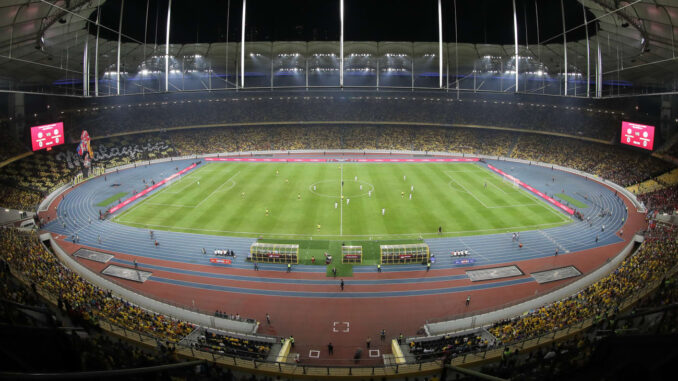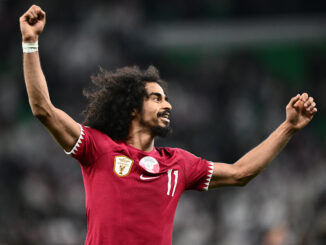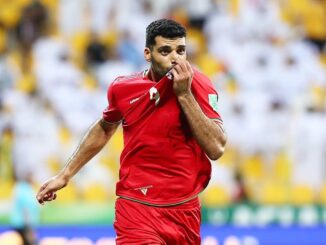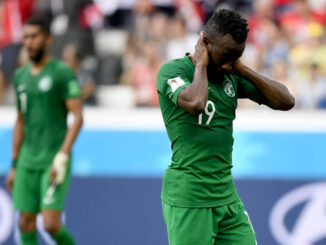
A 10-0 victory for Japan over Myanmar on Friday. A 7-0 win for China over Guam on Sunday.
Following on from an emphatically one-sided March (three matches, 22-0 cumulative scoreline), World Cup qualification in Asia is finding it hard going to retain the competitive illusion it had developed so well pre-COVID.
Regrettably, ahead of Round 2’s culmination over the coming fortnight, the cards seem stacked in the favour of yet more predictability.
The fluidity and devastation of some of this past weekend’s attacking play has at times been a joy to watch; Takumi Minamino is starting to fill out into a real continental star, while China’s new look attacking depth, primed by debutant Alan, did rise the pulse rate on more than one occasion, yet a myriad of dead rubbers lately have started to distract from a once well poised campaign.
This Thursday sees the return to competitive international football for many of the remaining 39 Asian nations. Asia was the first continent to be impacted by the global pandemic at the turn of 2020, and with the seemingly never ending hangovers still trickling out they look to be the last to return to any semblance of normality.
Looking enviously on, Europe returned to competitive competition by late 2020, while Asia barely got going in March the following year thanks to further localised lockdowns, border closures and political reluctance across the continent.
A make do centralised group format to rattle through the remaining Round 2 ties this June was the AFC’s only solution to meet a FIFA schedule that was slowly getting away from them, but one that’s not been without its fair share of challenges; hosting being the prickliest of them.
What started as an endeavour to pull Asia together, ended up as most things do when it comes to the AFC, as a political football. Running alongside the Champions League hosting selection back at the start of the year, national priorities and how they were considered by the corridors of power started to channel favour upwards.
Interest in ACL hosting was fleeting, especially in the East (despite a delayed start in June), yet World Cup qualification sought significant interest; China, South Korea and Japan all put their hands up despite failing to acknowledge their capability for continental club competition duties.
Given both competitions run concurrently, COVID preparedness became an ever more superficial smoke screen, with Japan even hosting international qualifiers in March, whilst pleading mitigation in hosting continental club football in June. Asian football priorities were being underlined.
Rather than challenge the power block; the AFC bowed to the big six; China, Japan, South Korea, Saudi Arabia, UAE and Qatar when hosting was confirmed in April, a telling blow to their already bumpy relationship with Iran.
Neither bid for club or country hubs proved successful for the IFF; ironically rated as unsuitable in comparison to India and Bahrain respectively, both offering hot and humid conditions, while battling their very own COVID national emergency.
Central Asian neighbours Uzbekistan were similarly snubbed; as UFA Technical Director and former international Aziz Haydarov admitted, a selection panel based in the Middle East made up of more than one representative from Saudi Arabia was unlikely to ever side with their World Cup qualification rivals in hosting at such a decisive juncture.
The AFC’s almost belittling concession of ACL East hosting privileges to Uzbekistan, at the 11th hour, once they couldn’t source interest elsewhere, was scant reward for an aspiring continental heavyweight.
Hosting will play a critical if not decisive role in who will progress from Round 2 later in June, but tipping the scales further will be a similarly weighted schedule.
Seeded nations; including the big six, are granted longer and more regular breaks over the coming weeks’ round robin; unsurprisingly started by Japan and China this weekend, at least five days before their rivals even kick a ball.
Japan and Saudi Arabia’s willingness to exploit their modest group rivals to bring forward and reverse hosting back in March was yet another sanctioned step to ease their schedule and cushion their progression hopes.
If arranging this month’s worth of action was an organisational headache in itself, North Korea’s withdrawal on the eve of the round’s culmination added yet more fuel to the fire.
News of their intentions, revealed last month, hardly surprised anyone; travelling to South Korea for their less than triumphant Group H finale, would’ve added legitimacy to their political foe, while their uncertain COVID local resilience couldn’t be risked any further.
FIFA’s expulsion, and subsequent erasure of all North Korea matches this cycle, did however provide some upheaval.
Turkmenistan, shock leaders ahead of South Korea at the COVID break, dropped back to third, leapfrogged by the Taegurk Warriors and Lebanon, now in a healthy position to qualify, given their negative results against North Korea were erased from the record.
With the lopsided nature of the qualifying structure, and the growingly problematic cross group rankings considered for the best runners up spots, North Korea will join other 5th placed sides in having their matches discounted from the head-to-head rankings.
There were plenty of critics when the system of “best runners up” was introduced at the start of the cycle, merely on parity concerns; but given the AFC find it difficult to pass through twelve months without banning a nation or two from its own competitions, it looks a glaring consideration omission in hindsight.
While there will be some beneficiaries; China in particular given their recent goal difference boosting 7-0 hammering of Guam; for those in tighter groups the seesaw is once again tipped days out from Round 2 completion.
It may not have been what they initially planned for, but reducing the impact of those real David v Goliath contests may act as a long term leveller for the AFC; just don’t suggest that to Iranian fans at this point…
A third dagger to proceedings came on Monday morning, as positive COVID tests in the Maldives camp pre-flight flustered Group A hosts China into a hasty request to move the group to the UAE, despite kicking off the centralised hub only a day earlier.
The CFA announced that all remaining group clashes will be moved to Dubai, with no indication if any further quarantine measures are required once they land. Following this further PR disaster, the AFC will now have to deal with a defecting host, and the inevitable appeals that’ll fly their way (Guam have already confirmed theirs).
The AFC then, head into what should have been their prime in-cycle spectacle, in tarnished form.
The good news, if any, to come out of the next few weeks of football will rest on those unexpected stories of success or infamous falls at the last post that rely on the assumption that the script isn’t fully written yet.
China may be in good form, with the schedule on their side (though things are changing), but still trail Syria by five points in Group A, while Iraq and Bahrain look to hang onto a slim advantage over a bruised but regrouping Iran in Group C.
Group G’s four way fight for progression between Vietnam, Malaysia, Thailand and UAE looks the pick of the bunch, closely followed by the growingly pivotal rivalry between Saudi Arabia and Uzbekistan.
Then there’s those unlikely few aiming to make a last ditch dart for the finishing line; Tajikistan, bolstered by a squad who found success in the ACL with Istiklol last month, are the joker in the pack, while Oman and a rekindled Lebanon offer two other feel good tales for neutrals to consider.
While the odds and favour stack against it; scratch the surface and Asian international football has the variety, the story lines and ultimately the quality to prove it remains competitive. It’s one thing to promise though, and another to deliver.
Photo: Asian Football Confederation
Listen to Episode 69 of The Asian Game podcast as we preview the resumption of FIFA World Cup qualifying




